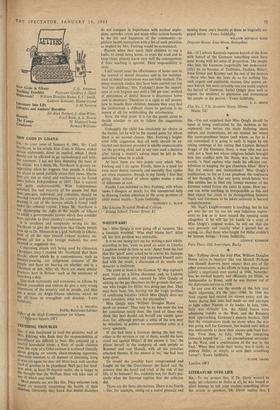LITERATURE INTO LIFE SIR,--To my protest that, if Dr. Davie
wanted to make his reference to Delta at all, he was bound in plain honour to tell your readers something about the article in question, Dr. Davie replies that I
was comically expressing 'the solemn conviction that the details of Cambridge's parochial squabbles are of consuming interest to the world at large.' To my suggestion that the position on education that his article as a whole was criticising was really that of
Dr. Leavis, and of Socrates and of Plato, while such a Position as that of Mr. Holbrook did seem open to doubt, Dr. Davie replies that I am 'descending to Personalities.' Was I really doing either thing? The editors of Delta have already made one strong charge Of misrepresentation against Dr. Davie. There is surely a difference between descending to personali- ties and making unabusive particular references for the sake of clearness of thought. I am grateful to Dr. Holloway for his reasoned disagreement, but his very failure to make particular references makes the exact nature of his disagreement unclear to me. To state as I did that a humanities study has no serious function if it is not ultimately the study of how to live is to state very little: it could mean many things, bad and good, and, as Dr. Davie says, 'much virtue in that "ultimately." t For more precision I made those brief particular references. Is Dr. Holloway dis- agreeing with Socrates, Plato, and Dr. Leavis (and other of the great humanities teachers in European history) as well as with myself? Or does he feel that have misinterpreted their positions?
It is because of the work of the great teachers who have known, I suggest, that the main purpose of non- technical study is to answer the question quam sit humaniter vivendum that we have our institutions providing for the study of the 'humanities.' It is because of the work of the great critics who have known so keenly the importance that literature can have in our lives that we have the institution of a conventionally respected and academically studied English literature.' The great danger is always, not that a few lesser men will let the exciting seriousness of the great men go to their heads, but that the many lesser men in the institutions will take the existence of the humanities too much for granted, as justifying Itself without any real reference in principle or practice to the original work of the great men. This is always the great danger just because the working in real reference to that work perpetually involves the difficult and creative task of renewing it in terms of our own times. It was this weakness of 'academicism and 'literariness' that I found in Dr. Davie's article: Alexandrianism' was the word Dr. Holloway him- self used in disagreeing some years ago with a different article of Dr. Davie's.—Yours faithfully, J. M. NEWTON 10 Hinton Avenue, Cambridge



































 Previous page
Previous page